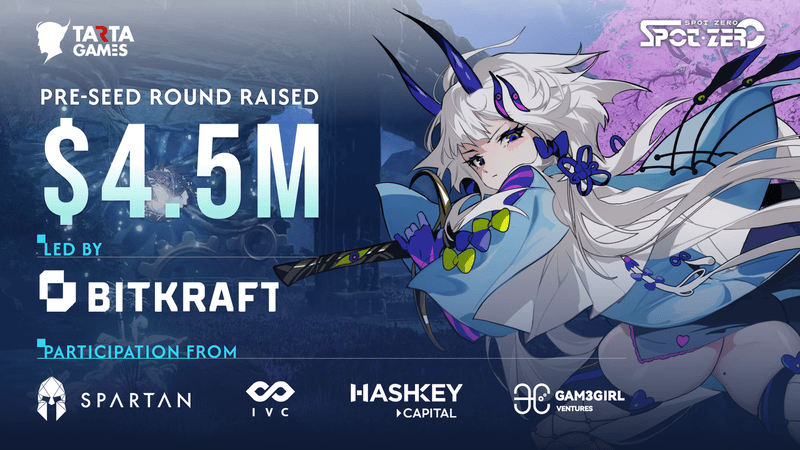
Tarta Labs Raises 4.5 Million to Launch Spot Zero a 3D Anime ARPG Blending Web3 and High Fantasy
"6 Million Players, $4.5M Raised, and a Bet on Web3: Can 'Spot Zero' Redefine Anime Gaming?"
Anime action RPGs have traditionally been the domain of giants—titles like Genshin Impact and Blue Protocol have dominated the genre with massive budgets, cinematic world-building, and loyal fanbases.

Tarta Labs, a Singapore-based studio, just closed a $4.5 million pre-seed round to bring its flagship title Spot Zero to market. With over six million users already registered before launch, and strong backing from major players in gaming and Web3, this isn’t just another crypto game launch—it could be the moment where anime, ARPG, and Web3 finally converge in a meaningful way.
The Game: Anime Aesthetics Meet Blockchain Utility
Spot Zero, developed by Tarta Labs’ in-house studio Tarta Games, is a 3D anime-style ARPG set on the continent of Noah, where humans and yokai coexist in fragile harmony. Players assume the role of an “Investigator” uncovering ancient truths, traversing a richly designed world that merges mechanical ingenuity with high fantasy lore.

Key features include:
- World Design: A stunning mythical-mechanical setting that explores divine legacy and hidden epochs.
- Narrative-Driven Companions: Story arcs tied to character relationships, emotional choices, and shared in-game history.
- Combat System: Dynamic combat with diverse weapons and skills designed to support both casual and competitive players.
Unlike most Web3 games, Spot Zero isn’t leaning on blockchain as a marketing crutch. Instead, Tarta Labs is using on-chain functionality to enable true digital asset ownership, integrated economic incentives, and community-driven value accrual—while promising a tier-one gameplay experience that competes with Web2’s best.
True digital asset ownership in Web3, often enabled by NFTs, means users have verifiable control and possession over their digital items, like game assets. This contrasts with Web2 models where assets are typically licensed and locked to a specific platform, giving Web3 users benefits like potential interoperability and independent trading.
Traction: A Pre-Launch Community That Defies Expectations
While pre-launch metrics can often mislead, Tarta Labs’ early data is difficult to ignore:
- 4.65 million pre-registrations from the initial campaign
- 6.1 million total user registrations in just over a month
- 687,000+ players engaged in active quests
- 442,912 on-chain transactions already recorded
- 3,000+ Steam-linked users logging over 100 hours each in early gameplay
Top geographies include Japan (17.5%), North America (16.9%), Indonesia (8%), Hong Kong (7.8%), and South Korea (5.4%)—reflecting both the game’s cultural fluency and its global reach.
This combination of early adoption, gameplay time, and on-chain activity indicates genuine interest—not just speculative enthusiasm.
Funding and Strategic Backing
Tarta Labs’ $4.5 million pre-seed round was led by BITKRAFT Ventures, with participation from The Spartan Group, IVC, HashKey Capital, and Gam3Girl Ventures. These firms aren’t just adding capital—they’re betting on a broader thesis:
Jonathan, Partner at BITKRAFT Ventures, notes the growing confluence of anime, comics, and gaming (ACG) as a global cultural medium. Spot Zero, he argues, is positioned to innovate at the intersection of parasocial experiences and blockchain-native gameplay.
Tommy from The Spartan Group emphasizes the genre’s high entry bar—breathtaking visuals, strong narrative, and retention mechanics. For him, Spot Zero isn’t just another Web3 experiment; it’s one of the few projects with breakout franchise potential.
Ann at IVC believes the game meets tier-one Web2 standards in both design and execution—a rare feat in the Web3 space. “Spot Zero challenges the notion that blockchain games are second-rate,” she says.
The team behind Tarta Labs also draws praise. Junbo at HashKey Capital recalls testing an early build: “I lost hours experimenting with combo mechanics. It felt like playing a game I’d been waiting for, not just another Web3 demo.”
Market Positioning: Between Two Worlds
Tarta Labs occupies a unique—and precarious—position in the market. On one side, it faces the established Web2 anime ARPGs with massive resources, entrenched IP, and mature ecosystems. On the other, it competes against a fragmented and often underwhelming field of Web3 games, many of which have prioritized tokenomics over gameplay.

Yet, it may be this duality that gives Spot Zero its strategic edge.
Web2 Games vs Web3 Games
| Feature | Web2 Games | Web3 Games |
|---|---|---|
| Monetization Model | Centralized, one-sided transactions | Decentralized, play-to-earn (P2E) |
| Asset Ownership | Players do not own assets; controlled by developers | Players own assets as NFTs |
| Value Generation | No real-world value for in-game assets | In-game assets have real-world value |
| Interoperability | Limited to the game's ecosystem | Assets can be used across platforms |
| Revenue Streams | Traditional microtransactions and DLC | Includes NFT trading and token economies |
| Player Involvement | Limited influence on game development | Potential influence through DAOs and community governance |
Key Differentiators:
- Visual & Narrative Quality: Anime aesthetics that rival top-tier titles.
- Blockchain Integration with Substance: On-chain transactions, NFT ownership, and player incentives designed to enhance—not disrupt—the core gameplay loop.
- Global Community Engagement: Strong traction in anime-forward markets with expanding reach through influencer partnerships and regional KOLs.
The game has also received ecosystem grants from Arbitrum and Mantle, signaling institutional support within blockchain networks and validating its technical foundation.
Layer 2 blockchains, including examples like Arbitrum and Mantle Network, are secondary frameworks built atop primary blockchains (Layer 1s) to enhance scalability. They process transactions off the main chain, leading to increased speed and reduced transaction costs, making them suitable for applications like gaming that require high throughput.
The Bigger Picture: Web3 Gaming at an Inflection Point
The global anime ARPG market generates billions annually, and while blockchain’s promise has intrigued many, execution has fallen short—until now. Spot Zero’s blend of quality gameplay and on-chain utility could set a precedent.
Did You Know: The market for games like Spot Zero sits at a rapidly growing intersection. While specific figures for anime action RPGs aren't isolated, the global anime market was valued at nearly $35 billion in 2024 and projected to hit almost $87 billion by 2034 (9.6% annual growth). Similarly, the broader role-playing game market is forecast to expand from $23 billion in 2023 to over $53 billion by 2032 (9.8% annual growth). This strong, parallel expansion in both parent markets, driven by factors like streaming popularity, global fandom, and tech advancements, strongly suggests the anime action RPG sub-genre is also experiencing significant growth.
But there are hurdles:
- Web3 Perception Risk: Many gamers remain skeptical of blockchain features. Spot Zero must prove its tech serves gameplay, not just monetization.
- Retention Over Hype: High registration numbers mean little without long-term engagement. Sustained content, narrative expansion, and community feedback loops will be critical.
- Technical and Regulatory Complexity: Smart contract vulnerabilities, user onboarding, and compliance may hinder scale if not proactively addressed.
FD at Gam3Girl Ventures summarizes it well: "The traditional ACG genre is saturated, but in Web3, it's still largely untapped. Tarta Games could set a new benchmark—if they execute."
Conclusion: A High-Stakes Launch with High Potential
Tarta Labs is betting that a deeply immersive ARPG with integrated blockchain features can deliver more than novelty—it can offer lasting value to players, investors, and the broader industry. With Spot Zero, they’re not just chasing trends; they’re aiming to reshape expectations.
Their early traction suggests a strong product-market fit, but the real test will come with the April 2025 closed beta. If the team can convert interest into retention—and blockchain into meaningful engagement—they may have built not just a hit game, but a case study in how Web3 can truly elevate gaming.
Now the question is: Can Spot Zero prove that blockchain isn’t just compatible with premium gameplay—but actually enhances it?